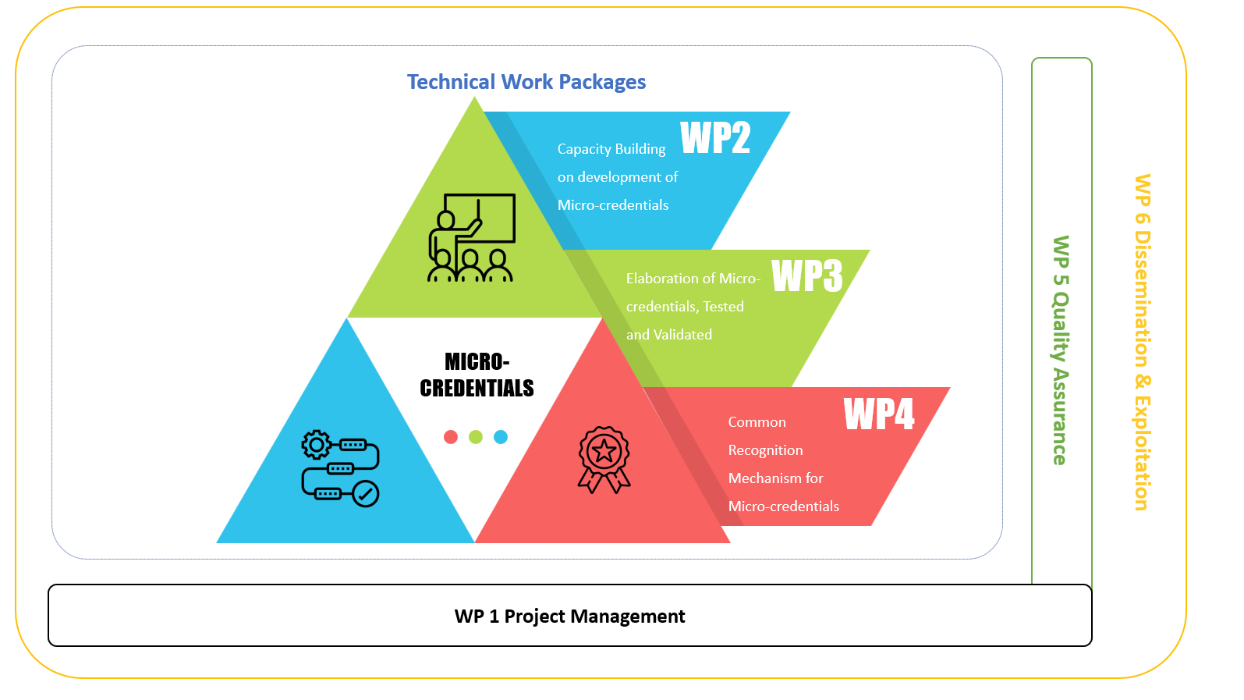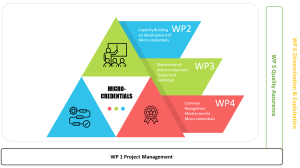
Call for a Quality Assurance External Evaluator
Brno, Czech Republic
03.06.2025
Call for a Quality Assurance External Evaluator
The MICRO4ASIA project consortium is looking for an independent expert to perform an external quality evaluation, provide an impartial and objective assessment of the quality of project’s activities, progress and results, and produce two reports.
Background
Project ID: 101179428
Programme: ERASMUS2027
DG / Agency: EACEA
Topic: ERASMUS-EDU-2024-CBHE-STRAND-2
Title: Strengthening the international dimension of universities in South-East Asia through the development of micro-credentials and their recognition (MICRO4ASIA)
The MICRO4ASIA project is aiming at modernization and internationalisation of the HEIs in Vietnam and Laos through development of a common mechanism facilitating wider using and recognition of micro-credentials and boost international academic mobility. The growing use of micro-credentials is an outcome of the changing nature of the labour market that requires graduates and professionals to be familiar with state-of-the-art knowledge, and to possess the skills and competences needed to make full use of technological and nontechnological know-how. Employers demand flexibility and quick reactions of HEIs and other educational organisations to changing circumstances. Micro-credentials are particularly useful in this situation, as they allow for tailored, quick and accessible skills (re)development. Common approach to micro-credentials will increase personalised learning opportunities for all. It will help widen learning opportunities and strengthen the role of higher education and vocational education and training (VET) institutions in promoting lifelong learning by providing more flexible and modular learning opportunities. While a growing number of higher education institutions are already working on the development of these micro-credentials, a common definition and a common approach on their validation and recognition is lacking (Commission, 2019a). In this context, the European Commission presented a proposal for a Council Recommendation in 2021 to build trust in microcredentials across Europe and aimed at having all the necessary steps in place by 2025 for their wider use, portability and recognition (Commission, 2020c).
The MICRO4ASIA project consortium aims to develop a common approach to micro-credentials using EU best practices and international experiences, but also in partner countries on local, national and international levels, taking in the account all new phenomena such as internationalisation of education and growing use of digital learning, creation of flexible learning pathways in line with learners’ needs and objectives etc. The common approach to the recognition of micro-credentials will increase equal opportunities and access to the quality education in partner’s countries, and the development of national educational and LLL systems.
The main objective of the MICRO4ASIA project is to support the development and use of micro-credentials by development of a common methodology for PCs HEIs to prepare and deliver micro-credentials, guidelines on the use of micro-credentials and their recognition, position paper for policy makers on the use of micro-credentials on the national level. The introduction of a common approach to micro credential will increase the capacities of PCs HEIs to enhance the quality, transparency, and take-up of small learning experiences leading to micro-credentials in line with national priorities and circumstances.
The MICRO4ASIA project brings together 10 partners from Europe and Southeast Asia, including higher education institutions, industry representatives, and educational organizations.
- P1 – Masaryk University (MU), CZ
- P2 – University of Dubrovnik (UNIDU), HR
- P3 – University of Siena (UNISI), IT
- P4 – Institut de Haute Formation aux Politiques Communautaires asbl, (IHF), BE
- P5 – University of Economics of Ho Chi Min City (UEH), VN
- P6 – Banking University of Ho Chi Min City (BUH), VN
- P7 – National Economics University of Hanoi (NEU), VN
- P8 – National University of Laos (NUOL), LA
- P9 – Banking Institute (BI), LA
- P10- Champassak University (CU), LA
The project duration is 36 months (from December 1, 2024, to November 30, 2027).
Project structure

Objectives
The external evaluator will be tasked with:
- Providing an objective and independent assessment of the quality of project implementation.
- Supporting the project consortium in improving the quality of activities and deliverables.
- Providing recommendations to improve project implementation and outcomes.
Tasks and responsibilities
The External Evaluator will perform the following tasks:
- Document Review
- Thoroughly familiarize themselves with key project documents, including but not limited to the Erasmus+ guidelines, Project Application, Quality Assurance Plan, progress reports, deliverables, dissemination materials and meeting minutes.
- Evaluation and Monitoring
- Conduct a formative (mid-term) evaluation to assess project implementation and bring ideas for improvements and innovations.
- Conduct a summative (final) evaluation to assess the overall achievements, quality, and impact of the MICRO4ASIA project.
- Monitor and analyze the achievement of quality indicators and project milestones in collaboration with the WP 5 team.
- Stakeholder Consultation
- Analyze feedback from project partners and relevant stakeholders through surveys, conduct interviews, or online/in person consultations. The expert will have an opportunity to meet some of the participants in project activities and explore their opinions.
- Reporting
- Prepare two independent evaluation reports:
- Final External Quality Evaluation Report (Deliverable D5.2) – Due by Month 36 (NOVEMBER 2027)
- Mid-term External Quality Evaluation Report (Deliverable D5.2) – Due by Month 18 (MAY 2026)
- Provide feedback, recommendations, and inputs to improve project implementation.
- Prepare two independent evaluation reports:
- Participation in Project Events
- Attend key project meetings:
- Attend 1st annual project meeting and a part of the Capacity building training on how develop micro-credentials in Dubrovnik, Croatia, in person (November 2025, 4 days minimum).
- Attend Closing project meeting in Hanoi, Vietnam, in person or online (November 2027, 3 days minimum).
- Attend at least one online project meeting mid-term (March/April/May 2026) before writing the first report due May 2026.
- Participate in virtual meetings and workshops (of consortium, Project Advisory Board, and other project bodies, if needed) and provide inputs when required by the project coordinator (Masaryk University).
- Attend key project meetings:
Timeline and reporting
The assignment will span over the period between month 8 and month 36 of the project realization period (July 2025 – November 2027).
The External Evaluator will report directly to the project ccordinator (Masaryk University).
When reviewing the activities and achievements of the project and discussing the project both with project staff and those who have participated in the project activities, the external evaluator will consider the following criteria: activities, relevance, effectiveness, impact, sustainability, and project management.
Compensation and travel requirements
The total compensation for the assignment will be limited by 10,000 EUR (including taxes and VAT of both contracting sides, if applicable). This amount covers all services provided by the external evaluator, as well as all expenses needed to attend project events (travel, accommodation, sustenance expenses, etc.).
Payment will be made according to the following schedule:
- First Installment: 20% of total compensation upon contract signing.
- Second Installment: 30% of total compensation upon delivery of the Mid-term Evaluation Report (M18).
- Final Installment: 50% of total compensation upon delivery of the Final Evaluation Report (M36).
Qualifications and Experience
The external evaluator is expected to have the following qualifications:
- Education & Professional Background
- Degree in Education, Management, International Relations, or other relevant fields.
- Experienced academic at a senior position – Professor, Associate Professor.
- Experience in international project management and/or quality assurance/lifelong learning (managing EU Tempus or ERASMUS+ Capacity Building projects in a partner country).
- Specific expertise in higher education, capacity building, or micro-credentials (short courses); being engaged in university internal Quality Assurance and Monitoring processes or the accreditation of university programmes.
- Experience
- Minimum of 3 years experience in management of EU-funded projects, preferably in the field of education and capacity building.
- Experience in conducting external evaluations in Higher Education or in Erasmus+ projects, particularly in Capacity Building in Higher Education, is desirable.
- Proven track record of collaboration with international consortia.
- Experience of leading or teaching on short courses for professional people in the framework of continuous professional education or lifelong learning is desirable.
- Skills
- Fluency in English (written and spoken).
- Strong analytical and reporting skills.
- Ability to work independently and adhere to deadlines.
Evaluation criteria:
- Relevant qualifications and experience (50%).
- Financial offer (50%).
- Applicants on the EU sanctions list will be automatically eliminated from the call.
The subcontracting of the external expert by the MICRO4ASIA consortium follows the rules of best-value-for-money and no conflict of interest.
Application
Interested candidates are invited to submit the following documents:
- CV with a short motivation letter reflecting the information in the call (short letter should be half a page max.)
- Financial offer (all-inclusive).
Send your applications to micro4asia@econ.muni.cz by 11 June 2025.
In case of questions, please contact the project manager Blanka Šustrová (Blanka.Sustrova@econ.muni.cz).
On behalf of the MICRO4ASIA project consortium,
Dušan Mladenović, Ph.D.
Principal investigator
Faculty of Economics and Administration
Masaryk University, Czech Republic

